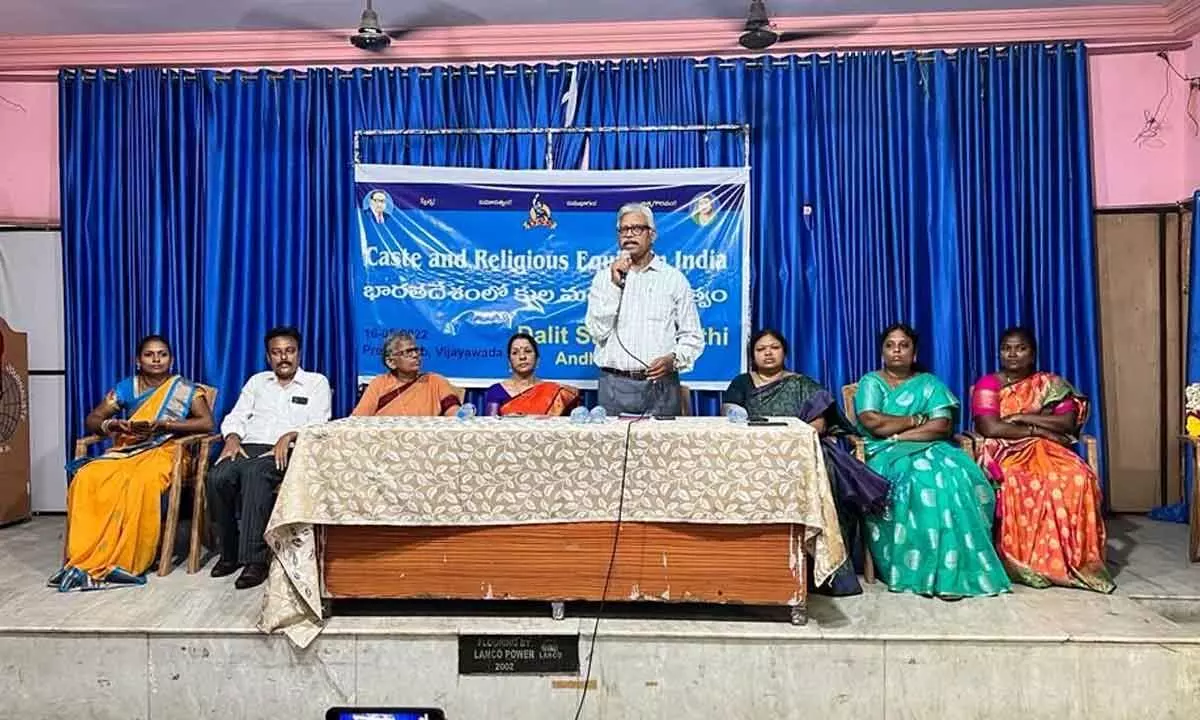Live
- GMR Airports Unveils AI-Powered Digital Twin Platform to Transform Airport Operations
- India poised to become leading maritime player: PM Modi
- Top Causes of Kidney Stones and How to Recognize Silent Symptoms
- India’s renewable energy capacity logs 14.2 pc growth at 213.7 GW
- Winter Session of Odisha Assembly adjourned sine die
- Biden calls Trump's tariff approach 'major mistake'
- After Drama Over Eknath Shinde’s Chief Minister Race, Maharashtra Cabinet Formation Faces New Tensions
- Egyptian FM, Blinken discuss recent developments in Syria
- Iran's supreme leader says Syria's developments result of US-Israeli 'plot'
- Elon Musk to Purchase $100 Million Luxury Mansion Next to Donald Trump's Mar-a-Lago, Report Reveals
Just In
Dalit women need to fight against inequality in society: DSS


A dignitary speaking at a workshop in Vijayawada on Wednesday
Everyone should agree with shame that inequality still exists in all fields of society even 75 years after independence, said Geddam Jhansi, the national convener of Dalit Sthree Sakthi (DSS), while addressing a workshop on 'Equality of religion, caste in the independent India', organised by DSS here on Wednesday.
Vijayawada (NTR District): Everyone should agree with shame that inequality still exists in all fields of society even 75 years after independence, said Geddam Jhansi, the national convener of Dalit Sthree Sakthi (DSS), while addressing a workshop on 'Equality of religion, caste in the independent India', organised by DSS here on Wednesday.
Prof KY Ratnam of Hyderabad Central University, Prof Saraswati Raj of Nagarjuna University, High Court advocate Dr Syed Babu, Sister Mary and DSS state coordinators Hemalata and Bhagyalakshmi were present.
Jhansi said that nobody sticks to the constitutional values and democratic principles were not adhering to, which could be attributed to the loopholes in the administrative system. "It is sad that nobody was discussing the removal of caste inequalities nowadays, but the discussions were more veered towards to the implementation of the reservations in order to deprive the facility to the oppressed sections," she said.
There is no respect for human being and also there is no one to question the outrageous behaviour of some sections that are taking the lives, honour and even the land of the oppressed sections, Jhansi lamented. More and more murders are taking place in case of love marriages, she said.
Prof Ratnam said that the directive principles of the State policy enshrined in the Constitution were not being implemented. Freedom of speech and freedom of religion are two important ingredients. Caste comes from religion and practice emerges from caste and the religion follows that practice, Ratnam pointed out. There are three important ingredients in freedom of religion—practice, profession and propaganda. Not surprisingly, people are not tolerant when these issues are utilised. Equality would be possible if there is tolerance, patience and secularism. Prof Ratnam said that there is no equality in society since the successive governments are dyed in religious colour. There should be awareness among people regarding fundamental rights and principles, Prof Ratnam said exhorting the Dalit women who have more patience to propagate these ideals.
Prof Saraswati Raj said that caste discrimination is rampant in society and poverty and illiteracy are adding fuel to fire. This would end if people acquire more skills for survival, she added.
Prof Syed Babu said that Sindhu culture had been attributed to Hindu religion. Right from marriage to death there is only one culture throughout the country, he pointed out. The politicians are least interested in education and never concentrate on schools. If the poor people studied, they would sure start questioning which was not palatable to the politicians, he said.
Sizable number of women leaders from various regions participated in the workshop.

© 2024 Hyderabad Media House Limited/The Hans India. All rights reserved. Powered by hocalwire.com






